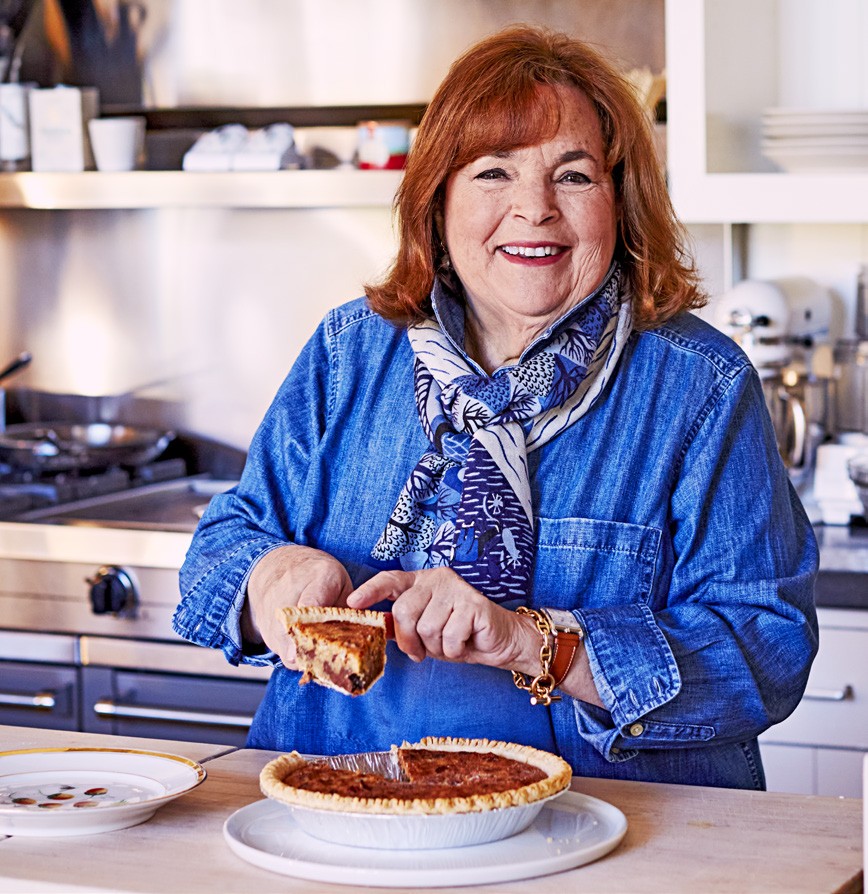Q&A with Ina Garten
“COOKING IS LIKE DRIVING A CAR. YOU HAVE TO ADJUST THE WHEEL ALONG THE WAY.”
—THE 76-YEAR-OLD TV PERSONALITY AND BEST-SELLING COOKBOOK AUTHOR’S NEW MEMOIR, BE READY WHEN THE LUCK HAPPENS, DESCRIBES BUILDING AN EMPIRE AROUND SIMPLE MEALS AND EVERYDAY HOSPITALITY

What’s your creative process, and has it changed as you’ve gotten older?
When I had my first book contract, the idea I started with was very specific. I wanted you to be able to open a book and say, “The photograph looks amazing. That looks delicious.” Then I wanted you to look at the recipe and say, “I can actually make that.” I have to say, that hasn’t really changed over the 25 years that I’ve been working on cookbooks. I’ve gotten better at it, gotten more detailed, but my creative process is pretty much the same.
In your new memoir, you write about difficulties growing up. How did you overcome that?
The negative voice in my head is my mother saying, “You think it’s a good idea, but it’ll turn out badly.” It’s always there. I’m very diligent about making sure that when I hear that voice, I counter it. I go, “Oh, that’s her voice. It’s not me. What do I think?”
Is there a “secret sauce” to living a more confident life?
I surround myself with people who are happy and positive and smart and funny—certainly my husband, Jeffrey, but others too—and we support each other. That gives you a sense of confidence. Somebody also once suggested that I get up each morning and write five things that I do really well. At first, I thought, Well, that’ll get me through a day, maybe a day and a half. But what I found is that over a period of several weeks, I could think of five more things—big things, little things—that I had done well. When I get anxious about my ability, I go to that list.
Your memoir describes plenty of pursuits before you bought the Barefoot Contessa food specialty store in New York; you learned to fly a plane, renovated houses and even landed a position in the White House Office of Management and Budget. Was there a career move that felt especially crazy?
Certainly leaving a very good job in the White House to buy Barefoot Contessa, a specialty food store in a place I’d never been, was about as crazy as it gets. [Laughs.] It was courageous but a little nuts! When I made the change, I thought I didn’t know anything. But once I went in, I thought, I do know how to do this.
How did your past prepare you?
Only in the process of writing the memoir did I come to understand that I actually had been doing everything I’d do at Barefoot Contessa, in my 20s, but I did it for fun. I’d taught myself how to cook. I’d taught myself how to renovate houses. I’d taught myself how to go to the bank and get a loan, things that you need to know when you run a business. Now I realize it wasn’t so crazy.
Your career can be physically demanding. How do you take care of yourself?
Having a body is really difficult! [Laughs.] I work out with a trainer twice a week, and I do yoga twice a week. I think both are really important. But also, as I’ve gotten older, I tend to work really hard in the mornings and then do other things in the afternoon. For a couple of hours a day, I have to be what I call “toes up”—I might read in bed or take a nap or answer emails. Your body tells you when you’re tired. Most of us just power through it, and that takes its toll. I’ve learned to listen.
Even after all these years, you write that cooking can still be really hard.
Cooking is like driving a car. You don’t just set it on a course and have it go straight; you have to adjust the wheel along the way. Maybe the chicken is a different size than you expected, or the carrots aren’t as sweet as they were last week. It takes enormous concentration. And that’s just before the guests arrive! The shopping and the cooking and the table setting and the flowers, and then at the end of it, appearing for your guests like you’re completely relaxed. It exhausted me when I was 25, and it still does. But I love doing it, so I keep doing it.
What advice would you give those for whom hosting a dinner party is intimidating?
The key is that it doesn’t matter what you serve. You can serve something simple that’s delicious with a peach tart from a bakery and have a very good time with your friends. You don’t have to make the peach tart.
What are you doing differently these days as a hostess that some of us might want to try?
I’ve come back to something that I used to do but hadn’t done in a long time, which is instead of doing dinner on Saturday night, which is a big deal with lots of courses, doing lunch on Sunday. The meal’s simpler. Everybody has more energy. They’ve done all their chores on Saturday, and I find the guests are more relaxed.
Interview by Dacey Orr Sivewright